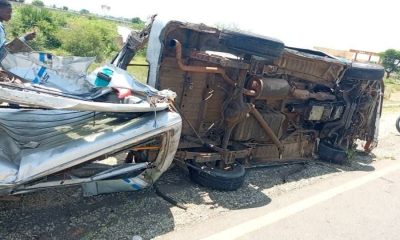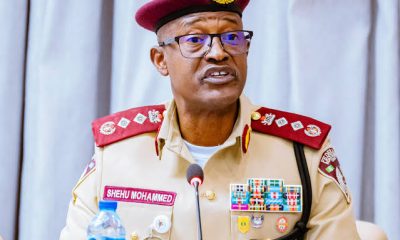Articles
FRSC Reports 6,858 Road Crashes, 3,433 Deaths in Nine Months

In what experts are now describing as a “national emergency on wheels,” the Federal Road Safety Corps (FRSC) has revealed that Nigeria recorded 6,858 road crashes between January and September 2025, leaving 3,433 dead and over 22,000 injured.
Also Read: Nigeria’s Speed Crisis: How Over 18,000 Road Crashes Could Be Prevented
The statistics, released in Abuja on Monday, provide one of the clearest pictures yet of how Nigeria’s roads have become death traps, a reflection of poor infrastructure, human error, and systemic neglect.
The figures also come just as the country enters the notorious “ember months” a period often marked by increased travel, reduced caution, and rising fatalities.
According to the FRSC’s public data, the 6,858 crashes recorded represent a 9.4% increase compared to the same period in 2024.
The Corps noted that more than 60% of these accidents occurred on federal highways linking major cities such as Abuja, Lagos, Port Harcourt, Kano, Ibadan, and Onitsha.
The breakdown reveals chilling trends:
- Total crashes: 6,858
- Deaths: 3,433
- Injuries: 22,162
- Fatalities per crash: 1.9 average
- Gender profile: 83% of victims male, 17% female
- Vehicle types involved: 41% commercial, 36% private, 14% trucks/tankers, 9% others
FRSC spokesperson Bisi Kazeem said the figures show “an urgent need for attitudinal change among Nigerian drivers,” adding that fatigue, speeding, phone use, and overloading remain the top causes of crashes nationwide.
“We continue to lose thousands of lives each year to preventable causes. The numbers are not just statistics; they represent fathers, mothers, and children who will never return home,” he said.
As Nigeria enters the ember months, the high-traffic period between October and January, FRSC officials are raising the alarm once again.
Historically, this is the period when Nigerians travel most: to hometowns, to family gatherings, to religious festivals and weddings. It’s also when more crashes happen.
Between October and December 2024 alone, the FRSC reported 2,612 deaths, accounting for nearly 30% of the year’s total. This pattern is already repeating in 2025.
Analysts attribute the ember-month spike to:
- Increased inter-state travel
- Night-time journeys due to traffic delays
- Poor vehicle maintenance
- Alcohol consumption among commercial drivers
- Reckless driving to meet daily targets
A commercial driver at Jibowu Motor Park in Lagos, Mr. Samson Akintunde, told RoadKing.ng,
“This time of the year, everybody wants to travel. Some drivers don’t sleep for two days. You see them dozing behind the wheel. The roads are bad, but the rush to make more trips makes it worse.”
Analysis of the FRSC data shows that a few corridors account for nearly half of all fatalities.
The top five killer highways in Nigeria as of September 2025 are:
- Lagos–Ibadan Expressway: Nigeria’s busiest highway and the most fatal.
- Abuja–Lokoja Highway: Known for its sharp bends and truck congestion.
- Benin–Ore–Sagamu Road: The link between South-South and South-West Nigeria.
- Kano–Zaria–Kaduna Road: A deadly northern corridor, especially for night travel.
- Enugu–Port Harcourt Expressway: A pothole-ridden stretch that claims lives weekly.
RoadKing.ng investigations revealed that most of these roads have remained under one form of “rehabilitation” or “expansion” for over five years. Poor lane markings, lack of lighting, and minimal patrol presence worsen the risks.
A civil engineer with the Federal Ministry of Works who spoke anonymously said:
“Some of these roads have outlived their design capacity. When you have 10,000 vehicles per day on a road meant for 3,000, you are guaranteed constant failures — and by extension, accidents.”
Behind every figure is a story of loss, pain, and often, injustice.
Take the story of Mrs. Kehinde Bamidele, whose husband, a 42-year-old mechanic, was killed in a crash along the Ibadan–Ogbomoso Road in May.
“He was coming home to see us after two weeks on a client’s vehicle. A truck lost control and crushed the bus he was in. They said he died instantly. I’ve been to the site; I can’t even look at that road again,” she said in tears.
Her story is one among thousands that never make the news. In rural areas, many deaths go unreported or misclassified as “vehicle faults.”
According to FRSC data, adult males constitute over 80% of road traffic deaths in Nigeria. The reason isn’t far-fetched, men make up the majority of commercial drivers, motorcyclists, and long-haul transporters.
Sociologist and road-safety advocate, Dr. Nneka Amah, explains:
“It’s a socio-economic problem. Men dominate driving professions, especially in inter-state logistics, where fatigue, over-speeding, and alcohol use are most common. Until we professionalize driving in Nigeria, accidents will continue to rise.”
The Economic Cost of Blood on the Asphalt
Every road crash in Nigeria carries not just a human cost but a financial one.
The World Bank estimates that Nigeria loses nearly ₦500 billion annually to road crashes, equivalent to about 3% of the country’s GDP.
These losses come from:
- Hospital bills and emergency care
- Lost productivity
- Property damage
- Burial expenses and compensation claims
- Traffic delays and fuel wastage
In addition, thousands of children are forced into poverty each year after losing breadwinners to road accidents.
Why Nigeria’s Roads Keep Failing
Experts list several systemic problems that sustain Nigeria’s road crisis:
- Poor road engineering and maintenance – Many Nigerian roads have collapsed shoulders and eroded edges, forcing vehicles into head-on collisions.
- Inadequate driver training – Over 70% of commercial drivers operate without formal certification.
- Weak enforcement – Despite FRSC efforts, bribe-taking and weak penalties dilute traffic laws.
- Ageing vehicle fleet – Over 60% of commercial buses and trucks on Nigerian roads are more than 15 years old.
- Lack of crash investigation culture – Few accidents are forensically investigated, so lessons are rarely learned.
In response to the rising numbers, FRSC Corps Marshal Shehu Mohammed announced new safety measures ahead of the ember months. These include:
- Deployment of 30,000 officers nationwide
- Establishment of 200 mobile ambulance points
- Aggressive enforcement of speed limits through radar guns
- Banning night journeys for unregistered transport operators
- Collaboration with the National Union of Road Transport Workers (NURTW) to train drivers
The Corps also plans to integrate AI-driven monitoring to detect reckless driving patterns, using data from traffic cameras and patrol reports.
While enforcement is important, experts insist that Nigeria needs a long-term national safety framework.
Transportation researcher Engr. Obinna Nwosu told RoadKing.ng that the government must focus on five pillars:
- Infrastructure renewal — Prioritize resurfacing of major highways.
- Driver education — Compulsory periodic testing and certification.
- Vehicle inspection reform — Digitized inspection records to prevent corruption.
- Data transparency — Publish crash data quarterly for accountability.
- Community involvement — Incentivize local safety advocacy through schools and transport unions.
“We can’t keep reacting after the crashes happen,” he said. “We need prevention at the policy level.”
At RoadKing.ng, we believe these numbers demand more than headlines, they demand change.
Nigeria’s roads can be safer if every driver, passenger, policymaker, and mechanic accepts responsibility. The data is grim, but it also gives us a blueprint for intervention.
We urge:
- Drivers: Rest, avoid over-speeding, and service vehicles regularly.
- Passengers: Speak up against reckless drivers.
- Government: Commit to modern road design and consistent enforcement.
- Civil Society: Push for transparency in road safety budgets.
Until these steps are taken, the FRSC’s next quarterly report will tell the same story, different numbers, same blood.



















